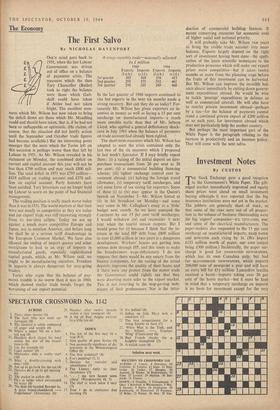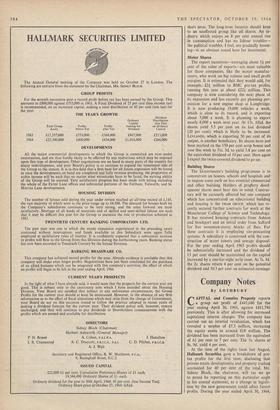Investment Notes
By CUSTOS
IHE Stock Exchange gave a good reception to the Government's White Paper. The gilt- edged market immediately improved and equity share prices went ahead on small investment buying although- it was reported that the big insurance institutions were not yet in the market. The jobbers are generally short of stock, so that some of the rises were out of all propor- tion to the volume of business. Outstanding were the big 'export' companies-tcr, LEYLANDS, BMC and some of the electrical manufacturers. The paper-makers also responded to the 15 per cent surcharge on manufactured imports, REED PAPER and BOWATER .each rising by ls. (We import £133 million worth of paper, our own output being £300 million.) Incidentally, the paper sur- charge is good for ASSOCIATED NEWSPAPERS, which has its own Canadian pulp, but bad for BEAVERBROOK NEWSPAPERS, which imports 200,000 tons of newsprint a year and will have
an extra bill for million. Lancashire textiles received a boost-imports taking over 30 per cent of the home market-but it must be kept in mind that a temporary surcharge on imports is no basis for investment except for the very
short term. The long-term investor should keep to an unaffected group like oil shares. An in- dustry which enjoys an 8 per cent annual rise in consumption and has no labour troubles— the political troubles, I feel, are gradually lessen- ing—is an obvious sound base for investment.
Motor Shares
The export incentives—averaging about 11 per cent of the value of exports—are most valuable for those companies, like the motor manufac- turers, who work on big volume and small profit margins. It is estimated that they would add, for example; £21 million to BMC pre-tax profits, running this year at about £221 million. This company is now considering the next phase of its expansion and has recently got planning per- mission for a new engine shop at Longbridge. It is now producing 19,000 vehicles a week, which is close to its record, and is exporting about 7,000 a week. It is planning to export nearly 8,000 a week next year. At 17s. 101d. the shares yield 5.5 per cent on its last dividend (20 per cent), which is likely to be increased. LEYLANDS, which is exporting 50 per cent of its output, is another beneficiary. Its shares have just been marked ex the 150 per cent scrip bonus and rose this week to 51s. 3d. to yield 3.8 per cent on the equivalent dividend of 10 per cent. Here again I expect the twice-covered dividend to go up.
Building Shares
The Government's building programme is to concentrate on houses, schools and hospitals and to impose some curb on less essential commercial and office building. Holders of property devel- opment shares must bear this in mind. Contrac- tors will be variously affected but one company which has concentrated on educational building and housing is the FRAM GROUP, which has re- cently secured further contracts for work at the Manchester College of Science and Technology. It has received housing contracts from Ashton and Stockport and an initial order from Salford for five seventeen-storey blocks of flats. For these contracts it is employing site-precasting systems. A subsidiary is concerned with the con- struction of water towers and sewage disposal. For the year ending April 1965 profits should be substantially increased and the dividend of 15 per cent should be maintained on the capital increased by a one-for-eight scrip issue. At 7s. 3d, the 2s. shares return 4 per cent on the potential dividend and 10.3 per cent on estimated earnings.



































 Previous page
Previous page